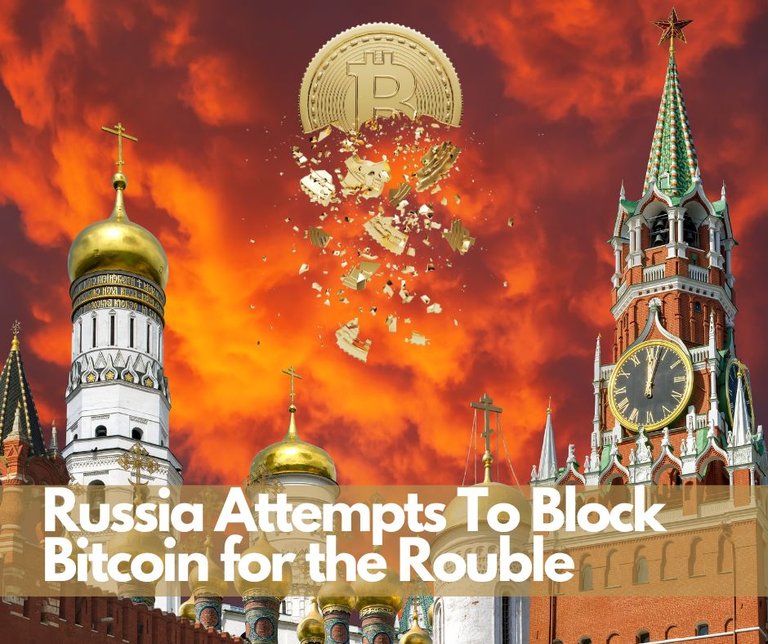
Russia Attempts To Block Bitcoin for the Rouble
Bitcoin (BTC) continues to be central to many nations economy now and discussions on how it can best contribute to supporting their economies continues to take centre stage.
The latest points raised come from Russie where Putin has been discussing how it can fit in with international payment systems as it looks to increase the power of BRICS Nations.
The BRICS nations consisting of Brazil, Russia, India, China and South Africa delve deeper into the realm of crypto currencies and the inclusion of Bitcoin in their financial systems is becoming increasingly pursued.
Recent statements from Russian President Vladimir Putin highlight significant concerns about the energy demands of Bitcoin mining suggesting that Russia which is a key BRICS member may advocate for excluding Bitcoin from the group's digital currency strategies.

Russia's Energy Concerns With Bitcoin
On July 17, 2024 President Vladimir Putin expressed grave concerns regarding the energy consumption of crypto currency mining in Russia. As the world's third largest crypto mining hub, Russia faces substantial energy challenges. Putin warned that unchecked crypto mining could lead to electricity disruptions across the country, particularly affecting new enterprises and residential areas. These concerns were exacerbated by a recent incident where Russia had to introduce electricity cutoffs in several regions due to a glitch at the Rostov nuclear power plant.
Crypto mining is notoriously energy intensive. According to Canadian energy company Just Energy the energy consumption of all crypto assets combined ranges from 0.4% to 0.9% of annual global electricity usage. This amounts to 120 to 240 billion kilowatt hours per year. This is more than the energy used by all the world's data centers combined. In the U.S. over 2% of energy is now devoted to crypto mining.
The BRICS nations have been exploring the use of digital currencies to enhance their financial systems and reduce dependence on the U.S. dollar. However, Putin's remarks may provide a critical obstacle the massive energy consumption associated with Bitcoin mining. Given Russia's significant role in the BRICS alliance, its stance on Bitcoin could influence the group's collective decision on whether to adopt Bitcoin as part of their digital currency initiatives.
Putin's call for strict regulations on crypto mining, including taxation and tariff decisions reflects a broader apprehension about the sustainability of Bitcoin mining. If these regulations are implemented, it could reduce Russia's attractiveness as a destination for Bitcoin mining, thereby diminishing its influence on the BRICS nations' collective stance on Bitcoin.

Geopolitical Concerns On The Move
Beyond energy concerns Russia's geopolitical and economic circumstances also play a crucial role in shaping its approach to Bitcoin and other crypto currencies. Western sanctions have significantly impacted Russia's ability to engage in international transactions. As a result, Russia has been exploring alternative payment methods, including crypto currencies to maintain trade flows with major partners such as China, India, the United Arab Emirates and Turkey.
In a bid to circumvent these sanctions Russia is pushing for the creation of infrastructure for crypto currency payments in international transactions. The new legislation, expected to be reviewed by the Russian parliament on July 23, 2024, aims to legalise the use of crypto currencies for international payments while ensuring compliance with Russian law. This move is seen as a necessity for businesses facing sanctions and needing access to the international market.

Russia's Push For A Digital Rouble
While Bitcoin's energy demands pose a significant challenge Russia is not entirely abandoning the concept of digital currencies. Instead, it is focusing on the experimental introduction of a digital rouble a blockchain based asset backed by the central bank. This digital rouble is part of a broader strategy to develop sovereign digital currencies that can facilitate bilateral transactions with other sanctioned countries.
Russia is actively working to connect its digital currency systems with those of Iran and similar negotiations are underway with China and Belarus. These collaborations highlight Russia's preference for state controlled digital currencies over decentralized ones like Bitcoin, which pose regulatory and energy consumption challenges.
The future of Bitcoin within the BRICS framework remains uncertain primarily due to Russia's concerns about the energy demands of Bitcoin mining and its broader geopolitical and economic strategies. President Putin's recent statements indicate a preference for regulated, state-controlled digital currencies over decentralized options like Bitcoin.
But no doubt this is a drive to have the Rouble in a prioritised position in an attempt to replace Bitcoin which has been successful in being pegged against the U.S Dollar so if nations were to adopt Bitcoin, they would be accepted USD as a default currency.
As the BRICS nations continue to explore digital currency initiatives, Russia's stance on Bitcoin will likely influence the group's collective approach, potentially leading to the exclusion of Bitcoin from their financial systems if it wants to avoid the USD. This development shows the complex interplay between energy sustainability, geopolitical dynamics and the evolving landscape of digital currencies as nations try to build a new system outside of the U.S Dollar.
Image sources provided supplemented by Canva Pro Subscription. This is not financial advice and readers are advised to undertake their own research or seek professional financial services.
Posted Using InLeo Alpha